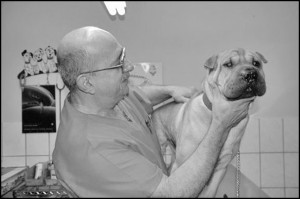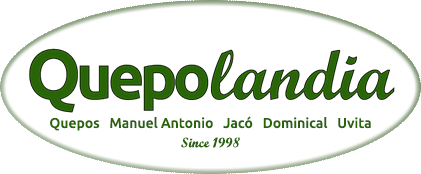Dr. Alfonso Gaspar Martinez del Pino
(en Español)
By Carol Vlassoff
 Dr. Alfonso Gaspar Martinez del Pino, born and educated in Cuba, says that he planned to stay in Costa Rica from the time he accepted an invitation to attend a conference here in 1995. Leaving his friends and family, with 63 pounds of luggage (59 pounds of it books) and $145 in his pocket, he set out to establish a new life here. He gave several lectures at the Escuela de Veterinaria de la Universidad Nacional Autónoma en el Barreal de Heredia, and then, he says, “I stayed.”
Dr. Alfonso Gaspar Martinez del Pino, born and educated in Cuba, says that he planned to stay in Costa Rica from the time he accepted an invitation to attend a conference here in 1995. Leaving his friends and family, with 63 pounds of luggage (59 pounds of it books) and $145 in his pocket, he set out to establish a new life here. He gave several lectures at the Escuela de Veterinaria de la Universidad Nacional Autónoma en el Barreal de Heredia, and then, he says, “I stayed.”
To make ends meet, he says, he worked as an administrator in an animal hospital in San José, and lived on the premises. He appealed for refugee status and validated his veterinarian certificate in record time. He did everything in three months – between May and July, 1995. “It went very fast,” he smiles. “I had to work. Life was very difficult.”
I knew that I wanted to interview Dr. Martinez from the time he saved the life of my 20 year old cat, Salvo. Completely paralyzed by a scorpion sting and unable to eat, I shakily handed Salvo to Dr. Martinez, expecting the worst. Indeed, he explained, he couldn’t promise anything, mainly because of the animal’s age. But three injections and a few words of encouragement later, Salvo was noticeably better. After returning three times for more injections, Dr. Martinez showed my husband how to give the needles himself, and Salvo recovered!
Dr. Martinez was raised in a rural village in Cuba where his father, a mechanical engineer, ran a dairy business. After graduating as a veterinarian, Martinez did two years of social service, and then joined the Universidad de Camagüey where he worked for 17 years as a professor and researcher in Veterinary Pathology. He spent his last five years in Cuba working in aquaculture, livestock and as a doctor to fighting cocks for export. Cock fighting, he says, is illegal in Cuba (as it is in Costa Rica).
In Costa Rica Dr. Martinez took a different career path, moving from academics to practice. He says he had to relearn many things – to reorient his specialty – because he hadn’t been a practicing veterinarian for many years. His experience in the fish industry served him well. He was offeed for the position of Regent Veterinarian in Martec Industries, S.A., in Quepos and moved here in 1997. After learning the ropes at Martec, he joined Vetecom on a part time basis. “Dr. Jorge Rojas helped me a great deal. He gave me a magnificent job! I worked from 2:00-6:00 p.m. – 50% of my time.” The two veterinarians saw the clinic grow from only a handful of clients to a thriving business.
In 1999 he opened his first private clinic in Manuel Antonio, where COSI Language School now stands. “It was a humble place,” he says, “open at night and outdoors. I needed light but the bulb attracted bugs that interfered with my work. So I installed a mosquito net and light over my table and operated there.” He moved back to Quepos in 2001, starting his clinic where Chikas is now, next door to his current location. Dr. Martinez built up a bustling enterprise at his Quepos clinic. He now splits his time between Martec in the morning, his private clinic in the afternoon, and his clinic in Immaculada in the evening.
What differences does he find in veterinarian practice between Costa Rica and Cuba? He replies that, unlike in other fields such as law, there are no essential differences in medical science from one place to another. An advantage of medicine is that people and animals are essentially the same everywhere, he says. However, the approach to animal health of the two countries is completely different, he says. In Cuba, the philosophy is almost entirely preventative – parasite control, vaccination, avoidance of disease – whereas in Costa Rica, it is almost entirely curative. In Cuba, veterinary practice focuses on productive species with minimal attention to domestic pets. It is a government service and private clinics do not exist. In Costa Rica, he says, veterinarian services are essentially private and specialize more in treatment than in prevention. Care of domestic pats pay an important role in veterinary work here and this specialization is more developed than in Cuba. “In Cuba it is concerned with the public health of animals whereas in Costa Rica the focus is on the individual animal.”
I ask Dr. Martinez why he works so hard. Surely three shifts a day, with a demanding workload, must be exhausting. He answers that he is rarely tired, that he prefers to do something useful to society, rather than wasting time watching television or surfing the internet.
I turn the conversation to his work in Immaculada, the poorest area of Quepos. He replies that he sees this as a social service because, for Immaculada residents, taking a taxi to Quepos to go to a veterinarian is very costly. By offering services locally, he says, everyone can afford to have a pet. “It’s the social service of a veterinarian,” he argues. Why should a child or a pensioner be denied the pleasure of having an animal because they don’t have money? he asks. Everyone should have a right to enjoy a healthy pet, not just rich people. “Medicine should be within everyone’s reach and for everyone,” he says.
Asked what changes he has seen in Quepos, he mentions economic progress, jobs, improvements in infrastructure and the rise in tourism. Over the years, too, he says, he has observed a difference in the behavior of the local people towards animals. At first clients came mainly to pick up a prescription for an ailing pet. “The culture of taking your pet to the veterinarian didn’t exist when I first came here,” he remarks. Now, he says, it’s a common sight. He attributes this change to the greater disposable income in the local economy and to the influence of foreigners in the area. Tourism isn’t just about having fun and creating local jobs. “A tourist also brings his culture and this culture little by little permeates the local community.”
He notes that there have also been negative changes, especially the growth in drugs and crime. These problems need to be urgently addressed, he says, because how we deal with them now will determine the future of Quepos. “If we don’t control them tourists will stop coming. When people see that it isn’t safe here they will go elsewhere.”
Dr. Martinez employs four people in his business; his wife, Doña Rosa Williamson, his youngest daughter, Leticia, and two employees. Doña Rosa administers his financial affairs. “This is very important, isn’t it?” he laughs. Leticia looks after the banking, and the two employees attend to the public and the store. Dr. Martinez’s other two children, Harris and Dayami, are famliar figures around Quepos. Harris works as a waiter in the Gran Escape and Dayami is the owner of Lynch Travel. Leticia is studying to become a veterinarian. The other members of the family are their dogs, Princesa, Zeus and Pinky, and their cat, Miniú.
Dr. Martinez says that his favorite animals are dogs and horses, but that he also likes cats. He says that he had many cats in his family when he was growing up. They lived under the house and ate in a big plate under a mango tree. “It was a paradise for cats!” he smiles. I ask if there is any truth to the adage that dogs are smarter than cats. Dr. Martinez shakes his head. He says that there is no difference, but because dogs are closer to humans and less independent, people think they are more like them. He adds that there is absolutely no truth to the saying – “fighting like dogs and cats”. In fact, they get along just fine, he says.
Dr. Martinez still visits Cuba whenever he can. Now a Costa Rican national, he says he has experienced no difficulties in moving between the two countries. In fact, he says, he and his wife spent a wonderful holiday there earlier this year.

Hola, mi nombre es Yaset Aldana, me gustaria establecer contacto con el Dr. Alfonso Martinez lo conoci durante mi etapa de ninez, soy veterinario radicadio en Jamaica, el Dr. Alfonso y mi padre (Francisco Aldana) son muy buenos amigos, el tambien es Medico Veterinario, pero no ha podido contactar con el Dr. Martinez.
Les agradeceria alguna direccion email de contacto.
Muchas gracias.
Dr. Yaset Aldana